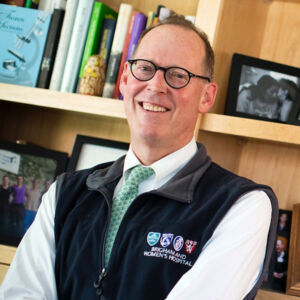Paul Edward Farmer, MD, PhD, passed away at the age of 62 in Butaro, Rwanda on February 21, 2022. He was the co-founder and chief strategist of Partners In Health, chair of the Department of Global Health and Social Medicine at Harvard Medical School, chief of the Division of Global Health Equity at Brigham and Women’s Hospital, and Kolokotrones University Professor at Harvard. Within the MGH Center for Global Health he was not only a colleague, but a mentor and friend to many. In the months since his passing, members of our community have shared their thoughts and reflections on Farmer’s life and legacy.
“He was an inspiration, a transformative thinker, a friend, a health justice North Star” Louise Ivers, MD, MPH, executive director of the Center for Global Health and long-time mentee and colleague of Farmer, reflected. “He pushed us all to do better.”
In his lifetime, Farmer authored and was profiled in several books, cared for hundreds of thousands of patients in countries such as Rwanda, Haiti, and Peru, and formed a network of peers, trainees, and mentees that spans the globe. Through his writing, clinical care, programmatic leadership, and mentorship, he left a profound impact on the field of global health.
“People underestimated his ability to be everywhere, talk to everyone, and build authentic personal connections,” Ivers says.
In addition to forming personal relationships, Farmer demanded the best for his patients. He fundamentally refused to believe lifesaving resources could not be distributed equitably.
“I believe in health care as a human right,” he once said in an article for the National Public Radio. “I’ve worked as a doctor in many places, and I’ve seen where to be poor means to be bereft of rights.”
This belief drove Farmer’s response to the HIV/AIDS pandemic. He refused to accept that low- and middle-income countries did not deserve access to antiretroviral therapy because patients would not be able to adhere to the treatments, a belief held by many at the time.
In defiance of these beliefs, Farmer commissioned a network of community health workers in Haiti to distribute the medications to patients who needed them and connect patients to much needed care. The effort’s success proved that patients could and would use lifesaving therapies if they had access to them and health care programs were designed to meet their needs.
“Paul’s insistence on equity, treatment, and health care for everyone was a big part of the foundation of the world’s insistence on treating HIV for everyone,” Ken Freedberg, MD, co-chair of the center’s global research collaborative reflects. “His effect was so profound on the individual level and across the world in ways we will only learn more about over time.”
As the global health community continues to mourn Farmer’s loss, the MGH Center for Global Health is committed to continuing his legacy through our belief that everyone, everywhere has a right to good health.
“[Farmer’s passing] is an opportunity to reflect on all of our paths and when we formulated our own personal missions,” Amir Mohareb, MD, Center for Global Health associate faculty commented. “This is a chance to look back and ask: What have we done since then?”
As we continue to mourn Dr. Farmer’s passing we want to share words from the people he impacted. A memorial service was held for him on March 12 and is archived here. Partners In Health has also released a series of tributes for Farmer and his legacy here.


